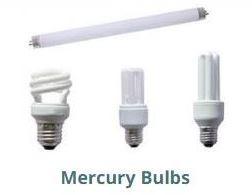Mercury-Containing Light Bulbs

Any mercury-containing bulb, regardless of the amount of mercury, cannot be discarded in the trash. Mercury-containing light bulbs manufactured after November 30, 2003 will be labeled, on the bulb itself, with "Contains Mercury" or the symbol "Hg" within a circle (Hg is the scientific symbol for mercury on the periodic table of elements).
Do not crush mercury-added bulbs. Bulbs should be stored in ways that avoid breakage as crushing releases mercury vapors that may pose health and environmental risks. Broken bulbs are hazardous waste.
The following types of bulbs contain mercury:
- Fluorescent, compact fluorescent, black lights
- High intensity discharge bulbs (HID). These bulbs are commonly used in security, outdoor and warehouse lighting. HID lighting is becoming popular for indoor use in commercial settings. The following are HID bulbs: mercury vapor, metal halide, high pressure sodium
- HID lighting is also used in vehicle headlamps. HID headlamps can be identified by their characteristic bluish-white tint when lit.
- Ultraviolet bulbs
- Neon bulbs
How to Recycle Mercury-Containing Light Bulbs
Vermont's Lamp Law provides a manufacturer-funded collection and recycling program for mercury-containing bulbs. Lamprecycle.org maintains a list of current manufacturers with approved collection plans.
Vermont residents, small businesses and institutions (such as schools) can recycle mercury-containing bulbs (including all fluorescent) at municipal and retail locations across the state. To find a collector near you, enter your zip-code at https://lamprecycle.org/en/location-search/
If you have larger quantities of non-CFL bulbs, check with your local municipality or solid waste district for recycling options. Businesses who handle larger volumes of bulbs from change-outs or retrofits can contact a local electrical wholesaler who offers bulb recycling to their customers or a commercial lamp recycler (a business that collects and recycles mercury, glass and metal components) for disposal. If it is not possible to use any of the previous disposal options, bulbs should be disposed of through a licensed hazardous waste transporter.
